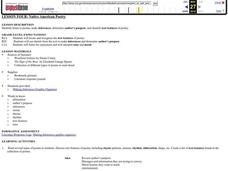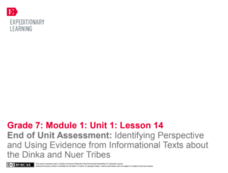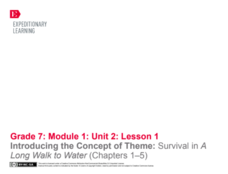Fluence Learning
Writing About Informational Text: The Dred Scott Decision
Looking for a performance assessment that asks individuals to demonstrate their competency in writing about informational text? Use Frederick Douglass' essay "On the Dred Scott Decision," and an excerpt from Abraham Lincoln's 1857 speech...
Curated OER
Nonfiction Text Features
Identify features of a nonfiction article in this language arts lesson. Middle schoolers apply comprehension strategies as they read the parts of the article, and analyze the author's key points. Additionally, they examine information in...
Ontario
Reading Informational Text
Learning to recognize the importance of the features of information text (i.e., titles, subtitles, endnotes, sidebars, etc.) is the focus of a reading activity designed for middle schoolers. Learners examine how these text features help...
Kentucky School for the Deaf
Levels of Organization within an Ecosystem
From tiny organisms to entire biomes, young scientists examine the interdependent relationships tying all living and non-living things together with this collection of ecology resources.
Ontario
Reading Graphic Text
Do learners really need to be taught how to read cartoons, comic books, and comic strips? Yes. Just as they need to learn how to read other forms of graphic text such as diagrams, photos, timetables, maps, charts, and tables. Young...
Curated OER
Native American Poetry
Identify text features, make inferences, and discover the cultural significance of Native American Poetry. Sixth graders read several Native American poems and use graphic organizers and literature response logs to record their feelings...
EngageNY
Research: Identifying Categories for Our Research About the Wheelwright
Here is a fine lesson plan on reading and understanding expository text designed for 4th graders. With a partner, learners read a passage of text about a machine called a wheelright. This machine was commonly used in the colonial period....
EngageNY
End of Unit Assessment: Identifying Perspective and Using Evidence from Informational Texts about the Dinka and Nuer Tribes
Pupils consider the varying perspectives of people in different cultural groups as they read an informational text about the Dinka tribe of Southern Sudan and complete graphic organizers. They also respond to a constructed-response...
EngageNY
Conducting Research: Analyzing Expert Texts about the Mary River Project
Pupils read informational texts about the Mary River Project, searching for the gist. As they read the expert texts, they complete a graphic organizer to identify and analyze point of view.
EngageNY
Identifying Author’s Opinion and Evidence: The Value of Sports in People’s Lives, Part I
Just like instant replay, it's time to take a closer look! Pupils work together to add ideas to a Close Readers Do These Things anchor chart. They then put their knowledge to the test as they read an informational article about the...
Curated OER
Teach Text Structure for Nonfiction
Students explore the patterns of text structure to anticipate the kind of information that a reading might present. The lesson examines some of the components of reading writing and using nonfiction.
National Council of Teachers of English
Timelines and Texts: Motivating Students to Read Nonfiction
With the emphasis on incorporating more nonfiction in language arts classes the question arises about how to design activities that motivate kids to engage with informational text. How about an assignment that asks class members to...
EngageNY
Grade 9 ELA Module 2, Unit 2, Lesson 3
The manipulation of time is one of the most essential elements in Sophocles' Oedipus the King. As your language arts class participates in a jigsaw discussion activity, they work together to analyze the play's plot structure and...
Curated OER
Characteristics of Nonfiction
The second lesson in a series from ReadWorks.org, this lesson continues to explore the difference between fiction and nonfiction texts. The lesson opens with the teacher reviewing a class Venn diagram started in the last lesson....
Curated OER
Read All About it
Learners create and publish a newspaper that reflects and explains pioneer and medieval societies. They become newspaper writers for a specific time period. They adopt a holistic approach to exploring community life in medieval and...
Columbus City Schools
Get Your Organisms Organized
From large to small, show your class how to organize them all! Included within the guide is everything you need to take their knowledge of classification from the cellular to the species level. The worksheets focus on building vocabulary...
EngageNY
Annotating the Text and Identifying Argument, Claims, and Evidence: “Double Whammy” Excerpt from “The Exterminator"
That's a double whammy! Scholars read the excerpt Double Whammy from The Exterminator. After identifying the gist of the text, they annotate by marking the author's claim. The group discusses what is meant by double whammy and complete...
EngageNY
Taking Notes Using a Graphic Organizer: Inferring About Work and Play in Colonial America
What was life like in colonial America? Follow this lesson plan and your pupils will find out what people in colonial times did for work and for fun. Ask learners to compare and contrast the two texts and explain what the reading helped...
Ontario
Critical Literacy—Media Texts
Media texts convey both overt and implied messages. As part of their study of media, class members analyze the language, form, techniques, and aesthetics in a variety of media texts.
National Institute of Open Schooling
Nomenclature and General Principles
Carbon, the base for all organic compounds, exists in nature in its purest form as graphite or diamonds. The 25th lesson in a series of 36 teaches pupils the nomenclature of organic compounds. Learners read about how to use the IUPAC...
Lerner Publishing
Meet the Dinosaurs
Take your class of youngsters on a prehistoric adventure with this four-lesson series on dinosaurs. Accompanying the Meet the Dinosaurs books by Don Lessem, these lessons engage children in writing their own dinosaur books, making...
PBS
Reading Adventure Pack: Farms
A Reading Adventure Pack features a fiction and nonfiction text—The Oxcart Man by Donald Hall and illustrated by Barbara Cooney and Farming by Gail Gibbons. Following the readings, scholars make a collage showcasing foods farmed from...
CC Homestead
Summarize
Designed for third graders but appropriate for older learners as well, this packet of materials underscores the necessity of teaching kids how to summarize, how to identify main ideas and supporting details, and how to ask questions...
EngageNY
Analyzing the Central Ideas, Part 2: “The Border”
Writers use the Short Response Graphic Organizer: The Border to learn how to answer short response questions. After completing the organizer, they rotate among classmates conducting peer critiques of their work.

























